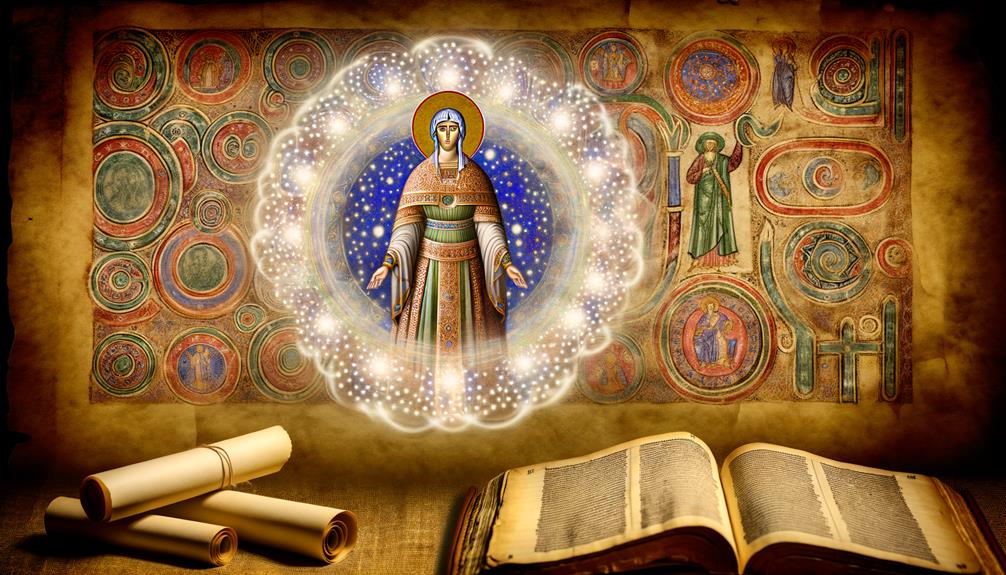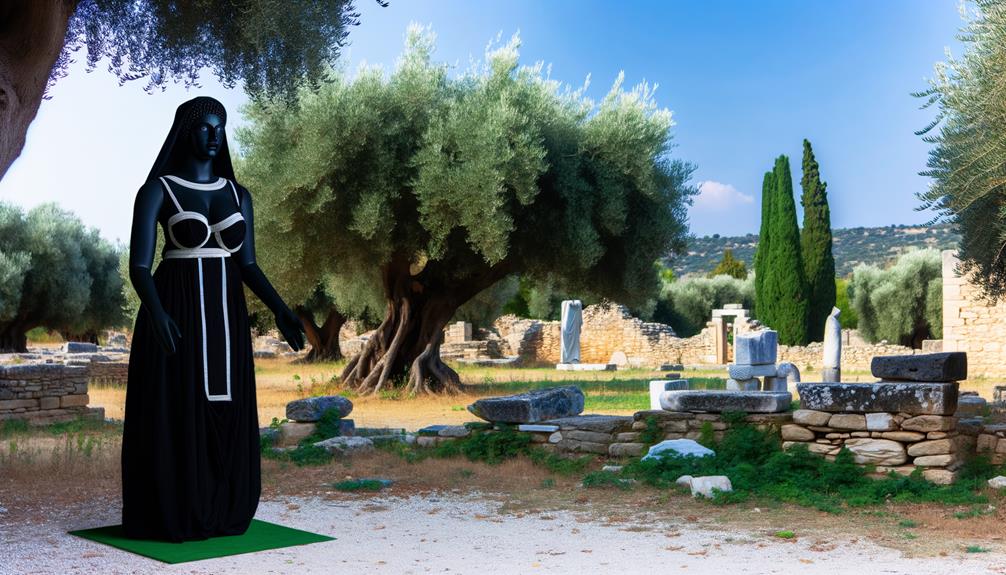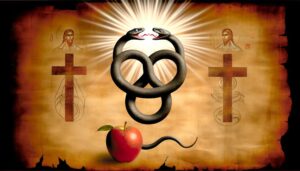Meaning Of Phaedra In The Bible: Spiritual Symbolism
The name Phaedra does not appear in Biblical texts, highlighting a distinct separation between Judeo-Christian narratives and Greco-Roman mythologies. While Phaedra, derived from the Greek word ‘phaidros’ meaning ‘bright’ or ‘radiant,’ symbolizes themes of light and purity in Hellenistic thought, it lacks direct theological relevance in the Bible.
This absence demonstrates the differing narrative structures and theological purposes between the traditions. Nonetheless, Phaedra’s mythological role influences early Christian thought, inviting reflection on ethical dilemmas and moral consequences, which enriches understanding of both faith systems.
Exploring these cultural intersections can deepen one’s appreciation for both traditions.

Meaning of Phaedra in the Bible: Spiritual Symbolism and Cultural Insight
| Aspect | Description |
|---|---|
| Name Origin | Greek origin meaning “bright” or “radiant” |
| Biblical Connection | Not directly mentioned in the Bible, but its meaning aligns with themes of light and purity |
| Symbolism | Light, radiance, inner beauty, and moral awareness |
| Related Scripture | Matthew 5:14 – “You are the light of the world…” |
| Spiritual Insight | Phaedra symbolizes spiritual illumination, the contrast of light vs darkness, and the call to live righteously |
Origin of the Name Phaedra

The name Phaedra, derived from ancient Greek mythology, carries significant historical and cultural connotations that shed light on its etymology and usage.
Originating from the Greek word ‘phaidros,’ meaning ‘bright’ or ‘radiant,’ Phaedra is most famously associated with the tragic figure in Greek mythology, the wife of Theseus and stepmother to Hippolytus.
Her story, marked by themes of love, betrayal, and fatal attraction, has been immortalized in classical literature and drama.
Historically, the name encapsulates a blend of beauty and tragedy, symbolizing both radiance and the darker complexities of human emotions.
This duality offers rich material for theological reflections on the interplay between light and shadow in human existence, making Phaedra a name imbued with profound significance.
Phaedra in Biblical Texts

Despite its rich mythological and cultural heritage, the name Phaedra does not appear in Biblical texts, suggesting an absence of direct theological or scriptural connections within the Judeo-Christian tradition.
This omission underscores a delineation between Judeo-Christian narratives and Greco-Roman mythologies, each with distinct deities, moral teachings, and cultural priorities.
Biblical texts primarily focus on figures imbued with theological significance or historical relevance to the covenantal relationship between God and humanity.
Phaedra, rooted in Greek mythology as a tragic figure entwined in tales of love and betrayal, does not align with the Biblical canon’s themes and characters.
Consequently, her absence highlights the differences in narrative structures and theological purposes between these ancient traditions.
Etymology and Linguistic Roots

Examining the etymology and linguistic roots of the name ‘Phaedra’ reveals its origins in ancient Greek, where it is derived from the word ‘phaidros,’ meaning ‘bright’ or ‘radiant.’
This nomenclature reflects a cultural reverence for light and purity, concepts deeply ingrained in Hellenistic thought. Historically, names imbued with such luminous qualities often carried connotations of virtue and divine favor.
While ‘Phaedra’ does not appear in Biblical texts, its Greek origin offers a fascinating lens through which to explore its potential theological implications. The emphasis on brightness can be symbolically linked to Biblical themes of enlightenment and divine illumination.
Consequently, understanding ‘Phaedra’ in its original context enriches our comprehension of its broader spiritual resonance.
Cultural Significance of Phaedra

The cultural significance of Phaedra emerges from her foundational role in Greek mythology, which profoundly influenced early Christian thought and Biblical exegesis.
This mythological figure has been a rich source of artistic representations, from classical literature to Renaissance painting, each interpretation reflecting evolving theological and moral perspectives.
Examining these cultural artifacts reveals the enduring impact of Phaedra’s story on both religious and secular narratives.
Mythology and Biblical Influence
In exploring the cultural significance of Phaedra, one must consider the interplay between Greek mythology and its influence on biblical narratives and theological interpretations. The character of Phaedra, from Euripides’ play, evokes themes of passion, guilt, and the human condition, which resonate within scriptural texts. This intersection of myth and scripture reveals deeper understandings of morality and human frailty.
| Aspect | Greek Mythology | Biblical Influence |
|---|---|---|
| Themes | Passion, Guilt, Tragedy | Sin, Redemption, Morality |
| Cultural Impact | Literary, Dramatic Works | Theological, Ethical Works |
| Character Study | Phaedra’s Complex Nature | Parallels in Biblical Figures |
Through this lens, one can discern how ancient myths like that of Phaedra shape and are mirrored in biblical teachings, enriching both literary and theological discourse.
Artistic Representations and Interpretations
Artistic representations of Phaedra have spanned centuries, reflecting her enduring allure and the multifaceted interpretations of her character across various cultural and historical contexts. These depictions offer a rich tapestry for analysis, providing insight into the complex interplay between myth and morality.
- Ancient Greek Tragedy: Euripides’ ‘Hippolytus’ portrays Phaedra as a tragic figure ensnared by forbidden love, highlighting themes of honor, shame, and divine retribution.
- Renaissance Art: Renaissance painters captured Phaedra’s torment, emphasizing human emotion and the moral consequences of passion.
- Modern Theatre: Contemporary adaptations often explore psychological dimensions, reinterpreting her narrative through modern sensibilities.
- Biblical Allegories: While not directly referenced in the Bible, Phaedra’s story parallels themes of sin and redemption, inviting theological reflection on human frailty.
These interpretations underscore her lasting cultural significance.
Phaedra in Religious Context

Although the name Phaedra does not explicitly appear in biblical texts, exploring its origins and cultural significance reveals intriguing intersections with ancient religious traditions.
Phaedra, rooted in Greek mythology, is associated with the tragic tales of the house of Theseus, reflecting themes of passion, betrayal, and moral conflict.
While not biblically referenced, understanding Phaedra’s mythological background offers insight into the broader Greco-Roman cultural milieu that influenced early Christian thought.
The confluence of these cultures often led to the syncretism of religious ideas, where mythological narratives were reinterpreted or juxtaposed with biblical themes.
Consequently, Phaedra’s narrative, though not scriptural, contributes to the rich tapestry of religious, ethical, and moral discourse in antiquity.
Symbolism of the Name Phaedra

The name Phaedra, steeped in Greek mythology, embodies a complex interplay of symbolic meanings that encompass themes of passionate love, destructive desire, and the moral repercussions of human actions.
Delving into these themes offers a rich tapestry of insights:
- Passionate Love: Phaedra’s story in mythological texts often reflects intense, forbidden love, highlighting the human capacity for deep emotional connections.
- Destructive Desire: Her narrative also serves as a cautionary tale about the dangers of uncontrolled desires, leading to tragic consequences.
- Moral Repercussions: Phaedra’s actions and their outcomes underscore the ethical dilemmas and the potential fallout of violating societal norms.
- Cultural Reflection: The name Phaedra encapsulates the broader cultural and theological narratives about human behavior and morality.
These elements combined offer a profound understanding of her symbolic significance.
Similar Names in the Bible

Frequently overlooked in biblical studies, the exploration of names akin to Phaedra within the Bible reveals intriguing parallels and divergences in their etymological roots, cultural implications, and theological significance.
Comparable names such as Phoebe, a deaconess mentioned in Romans 16:1, share Greek origins and denote brightness or purity. Delving into the Old Scripture, names like Hadassah—Esther’s Hebrew name—illustrate a blend of cultural symbolism and divine purpose.
These names often encapsulate individual narratives that contribute to the broader theological tapestry, embodying virtues or divine attributes.
Such an examination not only enriches our understanding of scriptural text but also highlights the intricate ways in which names encapsulate personal and collective identities within biblical history.
Modern Interpretations

In contemporary theological discourse, the interpretation of names like Phaedra—though not found directly in biblical texts—invites a nuanced examination of their cultural resonance and potential symbolic meanings within the broader Christian tradition.
Scholars often consider various aspects to draw parallels and insights:
- Etymological Roots: Exploring the Greek origins and meanings can provide insights into how names might be understood within a biblical framework.
- Literary Influence: Analyzing references in classical literature can reveal how such names might resonate symbolically.
- Theological Symbolism: Examining potential symbolic interpretations through Christian theological lenses.
- Cultural Integration: Understanding how modern Christian communities might incorporate non-biblical names into their spiritual and cultural practices.
These interpretations enrich our understanding of how names, even those outside biblical canon, can hold significant theological value.
Conclusion
In sum, the name Phaedra, while not directly mentioned in biblical texts, carries a rich etymological and cultural significance that interweaves classical mythology with linguistic evolution.
The exploration of its roots and symbolic meanings reveals a tapestry of historical and theological insights, underscoring the profound impact of names in religious and cultural narratives.
Through the lens of etymology and cultural context, one discerns the intricate layers of meaning that names like Phaedra contribute to the broader tapestry of human history.






